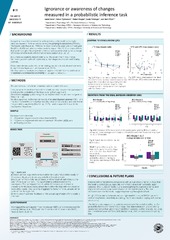Blar i forfatter Institutt for psykologi "Biegler, Robert"
-
Ignorance or awareness of changes measured in a probabilistic inference task
Kreis, Isabel Viola; Tjelmeland, Håkon; Biegler, Robert; Tröbinger, Luzia Rosa; Pfuhl, Gerit (Conference object; Konferansebidrag, 2017)A cognitive bias often reported for schizophrenia is the tendency to make decisions based on little evidence, namely the jumping to conclusions (JTC) bias. The beads task (Huq et al., 1988) is the most commonly used task to investigate the JTC and different attempts were made to explain the JTC. One proposition is that patients might miscomprehend the task and assume volatility, i.e. a change of ... -
Probabilistic inference in psychosis and autism
Kreis, Isabel Viola; Sandvik, Kristin; Tjelmeland, Håkon; Biegler, Robert; Pfuhl, Gerit (Conference object; Konferansebidrag, 2017)Within the predictive coding framework the brain is defined as an inference machine that continuously tries to predict its sensory inputs on the basis of beliefs about the world and updates those beliefs in the presence of contradictory sensory data (i.e. prediciton errors; Friston, 2005). Neurobiologically, the weighting and further processing of those prediction errors is thought to be influenced ... -
Sweet spot in music—Is predictability preferred among persons with psychotic-like experiences or autistic traits?
Lisøy, Rebekka Solvik; Pfuhl, Gerit; Sunde, Hans Fredrik; Biegler, Robert (Journal article; Tidsskriftartikkel; Peer reviewed, 2022-09-29)People prefer music with an intermediate level of predictability; not so predictable as to be boring, yet not so unpredictable that it ceases to be music. This sweet spot for predictability varies due to differences in the perception of predictability. The symptoms of both psychosis and Autism Spectrum Disorder have been attributed to overestimation of uncertainty, which predicts a preference ...


 English
English norsk
norsk

